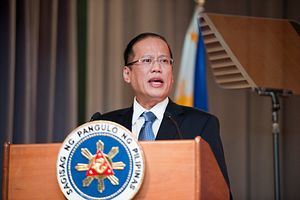The Philippines has decided to join the Chinese-led Asian Infrastructure Investment Bank after all, following months of hedging as the government in Manila considered the pros and cons.
The Philippines signed on to become a founding member of the Asian Infrastructure Investment Bank in October 2014, but government officials insisted later that “non-binding” agreement only positioned Manila as a prospective member. The Philippines, along with several other founding member states, expressed reservations regarding the bank’s governance – concerns that should have been addressed one way or the other with the finalization and signing of the bank’s charter in June 2015. However, the Philippines was one of seven countries that abstained from the signing ceremony because the agreement was still under consideration domestically.
In addition to concerns about the specific governance of the bank, the Philippines has broader worries about what the bank means for China’s role in the Asia-Pacific. Manila and Beijing bitterly dispute features in the South China Sea (along with other claimants Vietnam, Brunei, Malaysia, and Taiwan). The Philippines is currently pursuing an international arbitration case contesting China’s “nine-dash line” claim to much of the South China Sea – a case China has decried at every turn.
The disputes created deep-seated distrust in the Philippines about any moves that grant China yet more clout in the Asia-Pacific region. The AIIB, while not entirely Chinese-controlled, still sees Beijing in the driver’s seat with veto power over bank decisions. Plus, the AIIB is fundamentally tied to Beijing’s larger strategic vision of creating an economic “Belt and Road” to link China with the entire Eurasian continent.
Yet at the same time, the Philippines (like much of Southeast Asia) is in need of funding for its own infrastructure projects. Despite a bitter taste left by two high-profile Chinese projects that were eventually cancelled amid allegations of corruption, the AIIB presented an attractive option for Manila to bankroll domestic development.
Torn between these competing considerations, Manila waited until the last possible moment to make a decision – the deadline for founding members to join is December 31. On December 30, Philippine President Benigno Aquino approved the move to join the AIIB, following the recommendation of the Department of Finance, according to presidential spokesperson Herminio Coloma.
Philippine Finance Secretary Cesar Purisima expressed optimism for the AIIB in a statement, calling it a “a promising institution addressing investment needs, and will help close financing gaps in many countries.”
“The Philippines stands to gain from signing on as a founding member,” Purisima added. “We can look forward to deepening our country’s technical expertise in infrastructure as we expand bankable projects.”
According to the Department of Finance, either Purisima or the Philippines’ ambassador to China will officially sign the AIIB Articles of Agreement before the December 31 deadline passes. The Philippines will be the very last of the 57 prospective founding members to officially join the bank. Manila is expected to contribute $196 million to the bank’s coffers.
The Philippines’ decision represents another tiny step forward in a possible thaw between China and the Philippines, following Chinese President Xi Jinping’s decision to attend the APEC summit in Manila. While neither side shows any signs of backing down over the South China Sea, there may be room to jump start economic engagement by reverting to a 2011 agreement to segregate territorial issues from the broader relationship.
China has already insisted that the territorial disputes will not affect Manila’s participation in the AIIB. Foreign Ministry spokesperson Lu Kang said the idea that the South China Sea issue would impact the release of AIIB funds to projects in the Philippines was “making a far-fetched link between these two totally different things.”
“The operation of the AIIB follows the AIIB Charter which is formulated upon consultation among all members,” he added, implying that the bank will be insulated from any developments in China’s bilateral relations.
As Ankit Panda noted previously for The Diplomat, the AIIB’s Articles of Agreement entered into force on December 25, and the bank will officially begin operations on January 16, with the first meeting of its Board of Governors.

































